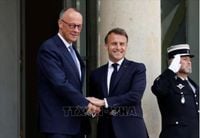On May 7, 2025, German Chancellor Friedrich Merz met with French President Emmanuel Macron in Paris, marking a significant diplomatic engagement aimed at revitalizing Franco-German relations. This meeting comes at a time of considerable geopolitical upheaval in Europe, showcasing the leaders' commitment to strengthening their bilateral ties, which have weakened in recent years.
The discussions between Merz and Macron attracted considerable attention, reflecting their determination to reinforce their leadership roles in Europe and enhance cooperation in addressing common challenges. In a joint press conference, both leaders affirmed their intention to establish a joint "defense and security council," signaling their commitment to tackle the pressing issues facing Europe together.
President Macron emphasized that this council would "maximize Franco-German coordination to enhance sovereignty and promote European interests." Merz echoed this sentiment, expressing his desire to "deepen and breathe new life into the Paris-Berlin relationship" and support a "Franco-German renewal for Europe." This mutual commitment highlights a shared vision for a more integrated European defense framework.
During their meeting, the topic of nuclear deterrence was also raised. Chancellor Merz, who supports placing Germany under the "nuclear umbrella" of France and Britain, expressed his willingness to discuss this issue further to complement existing agreements with U.S. partners in NATO. This openness marks a notable shift from Germany's traditional reliance on U.S. nuclear protection, reflecting a growing awareness in Berlin of the need for a stronger European sovereignty amid uncertainties regarding U.S. commitments to European security under former President Donald Trump.
On economic matters, both leaders committed to coordinating social and economic reform programs, particularly in labor and taxation. They stressed the necessity of making Europe "more prosperous and competitive" in an increasingly uncertain global landscape. The issue of U.S. tariffs was also addressed, with both leaders advocating for a unified European response.
Merz called for the rapid ratification and implementation of a free trade agreement with the Mercosur countries, a move that has faced resistance from France due to concerns about its impact on French farmers. Despite Germany easing its "debt limit" rules for military spending and investments, it has yet to agree to common European bonds, a long-standing French proposal.
Energy policy differences were also apparent, with France's reliance on nuclear energy contrasting with Germany's focus on renewable sources. However, in their joint statement, both sides called for an end to discrimination at the European level against low-carbon energy sources, including both nuclear and renewables, indicating a willingness to compromise.
The ongoing conflict in Ukraine was another critical topic. Both leaders reaffirmed their commitment to a "sovereign and independent Ukraine" and pledged to continue supporting Kyiv in collaboration with the U.S. to achieve a "comprehensive and lasting ceasefire." Despite their shared goals of revitalizing bilateral relations for the greater good of Europe, some disagreements remain, particularly regarding the supply of long-range missiles to Ukraine.
The Franco-German relationship, often referred to as the "engine" of Europe, has faced challenges during the tenure of former Chancellor Olaf Scholz, with tensions arising from differing views on energy, fiscal policy, defense, and trade. The political stagnation and the six-month crisis within Germany have raised concerns about the capacity of this Franco-German engine to drive European projects forward.
Merz's assumption of office has reignited hopes for improved bilateral relations. Described as a "very European prime minister," he appears to share a vision with Macron for a more sovereign Europe, particularly in defense matters. The joint declaration from their recent meeting underscored the need to "reset the foundations of Franco-German relations for Europe," acknowledging that this relationship must be renewed to meet current challenges.
Experts regard the proposal to establish a joint defense and security council as a significant step forward, enhancing the EU's collective response to security challenges. This move reflects the EU's concerns about U.S. security commitments, particularly amidst shifting political landscapes in America. Evelyn Gaiser from the Konrad Adenauer Foundation noted that Merz's immediate goal is to prepare a unified European stance ahead of the critical NATO summit in June 2025, where Europe aims to demonstrate its seriousness about defense commitments.
German lawmaker Roderich Kiesewetter argued that Germany must make concrete military commitments to earn the trust of its allies. Mujtaba Rahman of the Eurasia Group predicts that Franco-German cooperation could regain strength under the Macron-Merz leadership duo. He emphasized that both leaders recognize the importance of unity between Germany and France to guide Europe through its current challenges.
Political commentator Ulrich Ladurner from Die Zeit remarked that the "revival" of Franco-German relations holds both symbolic and practical significance. He noted that finding common ground on key issues would provide a strong impetus for the entire EU, especially as Europe grapples with significant security and economic challenges.
In summary, Chancellor Merz's visit to France represents a promising sign of efforts to revive and strengthen Franco-German relations in a new context. Close coordination between Paris and Berlin is crucial for Europe to effectively address multifaceted challenges and maintain its leadership role on the global stage. The differing perspectives between the two leaders may also create new dynamics in their relationship, provided they can find common ground on strategic issues.
As Europe faces the ongoing conflict in Ukraine, increasing global competition, and challenges from climate change and technology, unity and leadership from its two largest economies are essential. Thus, the meeting between Merz and Macron not only marks a new beginning for Franco-German relations but also for the entire EU.





